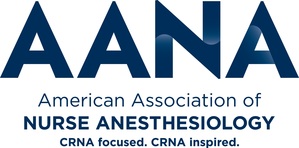AANA Applauds Introduction of The Improving Care and Access to Nurses Act
ROSEMONT, Ill., Sept. 27, 2022 /PRNewswire/ -- The Improving Care and Access to Nurses (ICAN) Act (HR 8812) recently introduced by Representatives Lucille Roybal-Allard (D-CA) and David Joyce (R-OH) will help ensure access to healthcare for millions of Americans by removing costly and unnecessary barriers to high-quality healthcare services. The American Association of Nurse Anesthesiology (AANA) supports this legislation, which will remove physician supervision of Certified Registered Nurse Anesthetists (CRNAs) and provide access to CRNA services in Medicaid.
Reps. Earl Blumenauer (D-OR), Adrian Smith (R-NE), Jan Schakowsky (D-IL), and Rodney Davis (R-IL) joined this bipartisan effort as ICAN Act cosponsors.
"AANA thanks all the sponsors for introducing the Improving Care and Access to Nurses legislation," said AANA President Angela Mund, DNP, CRNA. "As the only anesthesia providers in most rural hospitals, and the predominant providers in underserved communities, CRNAs play an important role in maintaining critical access in communities across the country. However, superfluous regulations serve as barriers to expanding care, especially at a time when those same communities face a shortage of providers. This critical legislation will help ensure that everyone who needs access to the high-quality care provided by advanced practice registered nurses such as CRNAs can have it."
Specifically, this legislation will ensure proper reimbursement for CRNAs to provide evaluation and management services for patients in Medicare, allow CRNAs to order and refer medically necessary services, permanently remove unnecessary physician supervision under Medicare, promote payment parity in the teaching rules, and provide access to CRNA services in Medicaid.
CRNAs, as advanced practice registered nurses, are members of one of the most trusted professions according to Gallup. CRNAs provide anesthesia care across all settings, including as the primary providers of anesthesia on the battlefield in forward surgical teams. Because of their expertise in anesthesia delivery, airway management, and care of critically ill patients, CRNAs have been highly sought-after healthcare providers during the COVID-19 pandemic.
"As a nurse anesthetist, I know firsthand how important it is to allow advanced practice registered nurses to work to the top of our education and scope," Mund said. "For more than two years Medicare has temporarily waived practice barriers to allow CRNAs and others to step up on the front lines of multiple global health challenges. I was inspired to see my fellow nurse anesthetists taking the lead in response to COVID, working to help the sickest patients under the most difficult conditions. We have seen how much nurses can do when we remove burdensome regulations and allow them to reach the full potential of their education and scope of practice."
When anesthesia delivery is staffed and directed by CRNAs, costly duplication of services is avoided. This can help healthcare facilities use limited resources to further improve patient care.
For more information about the ICAN Act and to urge your representative to support this legislation, visit AnesthesiaFacts .com.
SOURCE American Association of Nurse Anesthesiology

WANT YOUR COMPANY'S NEWS FEATURED ON PRNEWSWIRE.COM?
Newsrooms &
Influencers
Digital Media
Outlets
Journalists
Opted In





Share this article